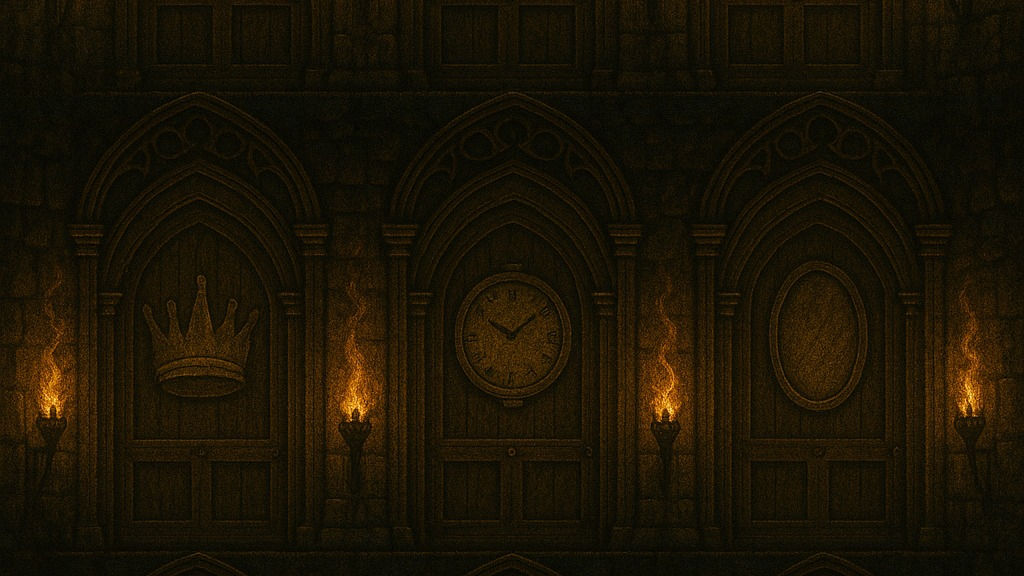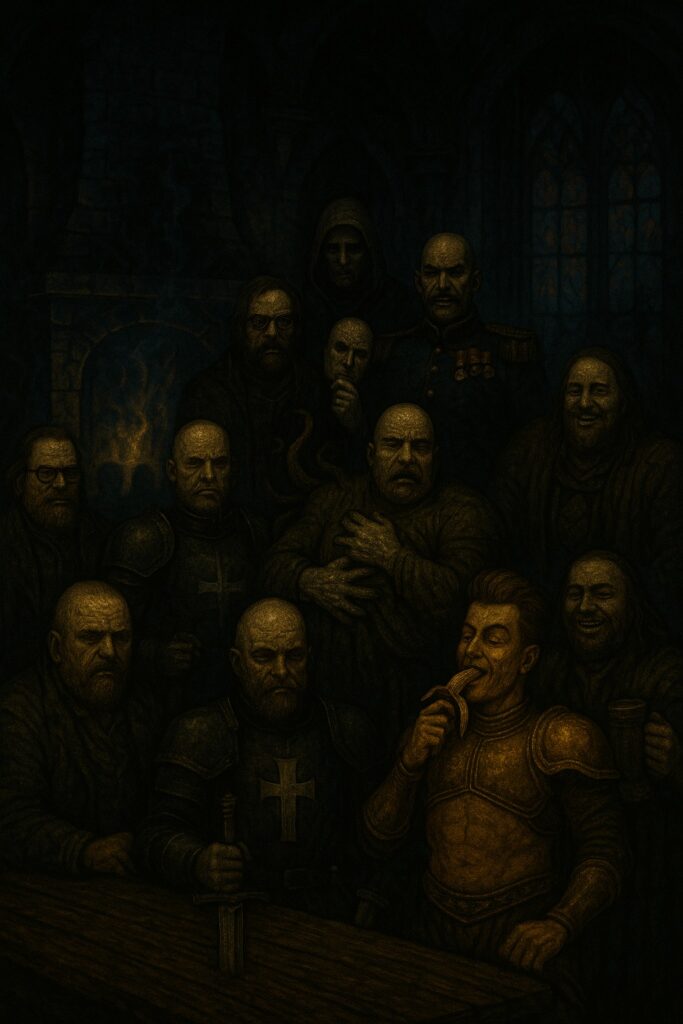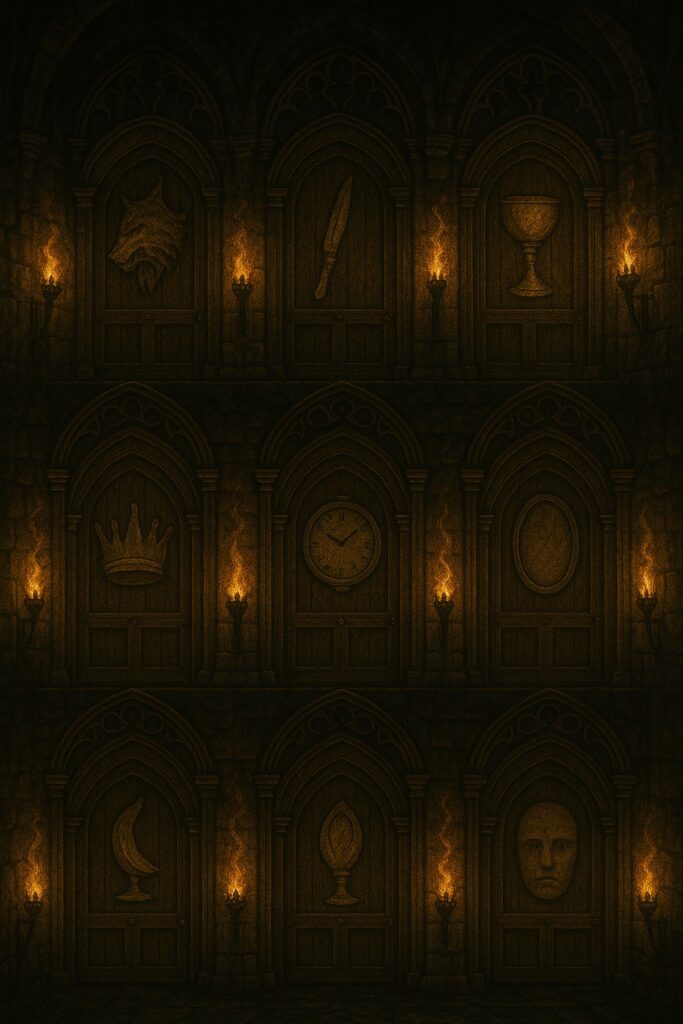They emerged, one by one, through different doors, arriving not where they began, but in the great common room, which now looked… wrong.
The hearth burned black-blue, not orange. Shadows gathered in the corners even where no walls stood.
The stained-glass windows wept bloodless tears, patterns shifting slightly as if trying to remember faces.
Gleg was the first to speak.
“We’re all back, right? Everyone made it?”
Nikiforos did a quick count.
General Pando’ Spiros narrowed his eyes.
“We’re here. But the room isn’t.”
Gogos touched a wall — and his hand passed through it.
Sir Patsir’ suddenly laughed, high-pitched and unhinged.
“We left. But we never left. We passed the tests. So where’s the reward?”
A small, silver one — from the bar counter.
A note had appeared where Gleg kept the menus.
“To leave a shadow, one must lose the light.”
The fire dimmed, flickering erratically.
And then came the true reveal:
Each of them had lost something. Not material. Not easily seen. But real.
The price was paid. The trials were survived.
But survival and victory are different things.
Gogos, quietly: “We gave the Inn something. But what did it get?”
No one answered. But one of the windows now bore a new figure in its stained glass. A crowned silhouette with no face. Watching.
Let the shadows shiver — for now comes the Audience with the Crownless King, a presence born of sacrifice, clothed in borrowed memory. The stained-glass figure watches them not from outside, but from within. It is both decoration and invader. And the ten must choose: challenge it, question it, or kneel.
 The Crownless King Speaks
The Crownless King Speaks
At first, it was just a shimmer.
The stained-glass window depicting the faceless crowned figure pulsed once — like a heartbeat through colored crystal. The figure had no face, but it looked at them.
Sir Kostanto stepped forward, hand on sword, gaze steady.
“Speak, glass demon. Or shatter.”
The Inn responded with a whisper, neither voice nor sound, but a pressure behind their thoughts.
Then the glass cracked inward — not broken, but opening.
The color from the window poured out like ink, pooling midair, shaping itself into a semi-transparent figure, robes swirling like storm clouds, crown floating slightly above its invisible skull.
“You lost much. You gave more. And so… I am born.”
Gogos stepped closer, tilting his head.
“Of your trials. Of your doubts. Of the pieces you offered unknowingly.”
Patsir scoffed. “We didn’t ask for a cursed mascot.”
The figure turned to him, and for a second, the air smelled like his father’s cologne — and then, nothing.
“You forgot a name. I remember it. That makes me more real than you.”
St. Amou scribbled furiously, though his formulas no longer stabilized.
“You’re… entropy made aware. Are you sentient?”
“I am Memory. I am Debt. I am… Host.”
Nikiforos stepped forward, calm, calculated.
“Then what do you want from us?”
The Crownless King’s form rippled. The crown spun slowly in place.
“I want nothing. You want purpose. I merely unfold what’s already begun.”
And then — the Inn trembled. The walls rearranged. The hall grew larger, impossibly so. New staircases spiraled from the ceiling downward. Doors opened onto voids, onto scenes they recognized from dreams — or regrets.
Gleg muttered, “This ain’t my layout.”
“Each of you walks with a chain. Some visible, some hidden. The game is no longer escape. The game… is revelation.”
Pando’ Spiros stepped in with sharp eyes.
“And what’s your role in this game, King Without a Name?”
“I am the referee. I enforce the cost.”
The group stood still — silent — until Koump’aros, twitching slightly, finally spoke:
“If this is a game… then what happens when one of us loses?”
“Then they become like me,” said the Crownless King. “And then… there are two kings.”
The figure turned, floating back toward the stained glass.
“The Inn has changed. Choose your next paths wisely. For the next doors do not lead to trials… but to each other.”
And then — with a sound like cracking ice — the Crownless King melted back into the glass.
But the window remained open.
And ten new doors appeared. Each one bore a symbol, not a name: a wolf, a scalpel, a clock, a chalice, a banana, a crown, a flame, a mirror, a cogwheel… and an empty face.
Excellent. The time for unity fades — the time for confrontation with self begins. Each door calls with a magnetic pull, bearing no names… but every symbol etched into them bleeds meaning only its owner can read.
 Ten Doors, Ten Paths
Ten Doors, Ten Paths
One by one, the group steps forward — drawn by instinct, memory, guilt. They separate again, but this time not by force… by inevitability.
 Nikiforos – The Door of the Wolf
Nikiforos – The Door of the Wolf
He stares at the snarling wolf insignia, carved into aged oak. It mirrors the calm predator behind his eyes.
“At last,” he whispers. “Not hiding anymore.”
He enters without hesitation, shadows gathering behind him like loyal hounds.
 Sir Kostanto – The Door of the Clock
Sir Kostanto – The Door of the Clock
Gears click and hands turn backward as he approaches the ancient brass door. The tick-tock resonates with his heartbeat.
“Time never mattered to me. But perhaps I owe it something.”
He opens it — and the door swings open to a world out of sync.
 Gogos – The Door of the Empty Face
Gogos – The Door of the Empty Face
The door is blank — no features, no handle. Just a void where a face should be. Fitting.
“What am I without the faces?” he mutters.
The door breathes open like a lung, and he steps into pure nothingness.
 Doc Pitoros – The Door of the Scalpel
Doc Pitoros – The Door of the Scalpel
Cold steel glints in the emblem. The door smells of antiseptic and blood. He lingers, unsure.
“I fix others. What if I need fixing?”
He presses in, surgical confidence faltering only slightly.
 General Pando’ Spiros – The Door of the Crown
General Pando’ Spiros – The Door of the Crown
The crown isn’t gold — it’s thorns. Strategy and power converge here.
“A general obeys logic. But logic… is sometimes cruel.”
He walks in, jaw set, mind sharp.
 Koump’aros – The Door of the Flame
Koump’aros – The Door of the Flame
It crackles and pulses like a living nerve. Alien heat, chaotic beauty.
“If the fire made me… perhaps it can undo me.”
He enters. The door slams shut behind him like a furnace lid.
 Gaslord Nikoko – The Door of the Chalice
Gaslord Nikoko – The Door of the Chalice
An upside-down cup. Spilling nothing. He almost laughs.
He drinks nothing from the etched image, then steps into a darkness that reeks of forgotten glory.
 Sir Patsir’ I.0. – The Door of the Banana
Sir Patsir’ I.0. – The Door of the Banana
The golden fruit carved absurdly well. It makes no sense. Like him.
“This… better not be another joke.”
The door opens to cheering crowds and muffled weeping. He vanishes behind it.
 Tech Priest St. Amou – The Door of the Cogwheel
Tech Priest St. Amou – The Door of the Cogwheel
It turns on its own, complex and infinite.
“Finally. Something I can decode.”
He touches it, and circuits hiss open. The door becomes code—and swallows him.
 Gleg – The Door of the Mirror (Disguised as a Tankard)
Gleg – The Door of the Mirror (Disguised as a Tankard)
It looks like his old tavern sign — a tankard. But when he touches it, the image warps. It’s his own face, distorted in the glass.
He walks through with no grin this time.
 The Inn Grows Silent
The Inn Grows Silent
Now the central hall stands empty. The Crownless King stares through all the windows at once.
In the walls, the Inn rearranges itself again. These doors no longer lead to trials — they lead to revelations. And perhaps, the beginnings of betrayal.
what seemed like a solitary path becomes a duel of truths. No longer is this journey about overcoming the self alone… now, it is also about reckoning with the other — their counterpart in sin, in weakness, in fate.
The Crownless King watches with quiet approval. This was always the true trial.
 Two by Two: The Rooms of Reflection
Two by Two: The Rooms of Reflection
As each enters their door, a strange sensation overcomes them. Time folds. Space warps. When they open their eyes… they are not alone.

 Nikiforos & St. Amou – Shadows and Circuits
Nikiforos & St. Amou – Shadows and Circuits
The room is an abandoned monastery twisted with machine tendrils. Candles flicker with electric pulses. The air is thick with incense and static.
Nikiforos stands silently in one corner, while St. Amou inspects the tech-infused altar.
“Monk,” Amou sneers, “Your shadows are crude compared to my precision.”
“And yet, your mind is tangled in your own code,” Nikiforos replies calmly. “Are you even sure you’re real anymore?”
The candles flare. Behind the altar, a mirror forms, showing them merged together, indistinguishable. Both recoil.

 Sir Kostanto & Sir Patsir’ I.0. – The Wreckage of Pride
Sir Kostanto & Sir Patsir’ I.0. – The Wreckage of Pride
They appear in a grand hall, half crumbled, filled with golden statues — all versions of themselves. Applause echoes from nowhere.
Patsir snorts. “Now this is my kind of room.”
Kostanto, grave as ever, mutters: “Too loud. Too fast. This place… it lies.”
One statue — a fusion of the two knights — cracks open, revealing a grotesque caricature of vanity and lawfulness gone mad.
To leave, they must destroy their ego… or each other.

 Gogos & Gleg – Faces and Facades
Gogos & Gleg – Faces and Facades
The room is an infinite tavern mirror. Every version of Gogos and Gleg stares back — cheerful, furious, broken, monstrous.
Gleg chuckles darkly. “You’ve got more faces than I have recipes.”
Gogos replies, voice echoing: “But which one is mine, barkeep?”
In the center of the room: a single bottle. One drink opens the door. But it must be shared—and each believes it might be poison.

 Pitoros & Nikoko – The Shattered Ward
Pitoros & Nikoko – The Shattered Ward
They stand in an overgrown battlefield clinic. Blood on the walls. Forgotten medals. Whispers of past failures.
Nikoko leans against a ruined cot. “Doctor. Fix me. I dare you.”
Pitoros glares. “Maybe I can’t. Maybe… maybe I never could.”
A patient lies dying in the center, face shifting between both men. To save it, they must confess the truth about their own delusions.

 Pando’ Spiros & Koump’aros – Strategy and Chaos
Pando’ Spiros & Koump’aros – Strategy and Chaos
The room is a war map — pieces scattered, factions unknown. But the terrain shifts with every word spoken.
Koump’aros slams the table. “I see the pieces… but I don’t know the game.”
Pando watches him coldly. “That’s because you are the chaos. You were never meant to win.”
Behind them, the enemy stirs — a force shaped like both of them entwined.
Only one can command it. Or destroy it.
 The Crownless King Whispers Again
The Crownless King Whispers Again
“See how they mirror and mar each other. In pairs, we unravel. In mirrors, we fracture.”
Ten souls. Five chambers. Each forged not by fear alone, but by confrontation — of self, of the Other.



